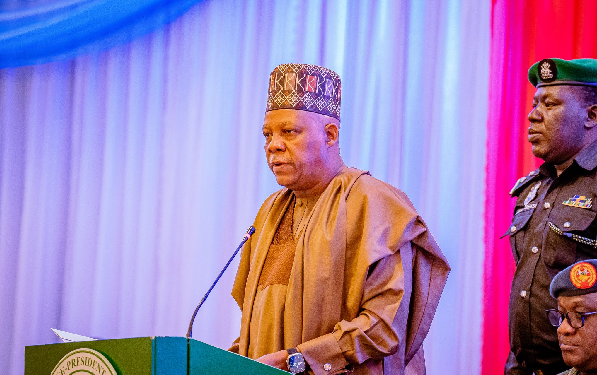The federal government is set to launch the Investment in Digital and Creative Enterprises (I-DICE) Programme which aims at creating two million jobs on May 15.
Vice President Kashim Shettima disclosed this at the second Chronicle Roundtable themed; “Tinubu Administration’s Economic and Social Agenda: How It will Transform Nigeria” in Abuja on Thursday.
Shettima who was the guest speaker at the event said the present administration anticipates a reduction in unemployment rate, adding that access to jobs is being addressed through initiatives such as the outsource to Nigeria initiative and IDICE.
He said the administration was working to ensure that the country’s economic growth rate exceeded the population growth rate while inflation figures dropped soon and appealed for the patience and collective sacrifice of all Nigerians.
“Soon, Nigeria’s economy will experience significant growth once we’ve overcome these sacrifices. Positive changes will soon be evident across all economic indicators – inflation, per capita income, GDP numbers, poverty reduction, food security, and all aspects close to the hearts of our people,” the Vice President said.
He described the subsidy on petroleum products which was removed at the inception of the administration as the “biggest elephant in the room” before President Tinubu took charge.
“We had to get rid of the subsidy or the subsidy we get from the Nigerian nation. It was a bitter pill to swallow but we had to do it. We look forward to the positive impact on the economy that will be brought by some of our new initiatives in the oil and gas sector, creative arts sector, the newly rejigged steel and solid minerals sectors, our housing sector, the blue economy, and the digital sectors, to mention but a few.
“There is no doubt that there’s a time to plant and a time to reap. In between those times, we appeal for patience and seek collective sacrifice from all, especially from us. We wish there were a way to treat this ailment without surgery”.
“We understood why our predecessor made the decision to remove it and refused to budget for it in their final fiscal year. The year before we took office, Nigeria’s debt service-to-revenue ratio had grown to 111.8%.
WThe anticipated debt crisis may sound like fancy economic jargon to the man on the street, but you and I are in a better position to understand how such miscalculations have played out in other countries.
It’s an economic death sentence.
“In plain terms, our debt servicing was such that if you earned, say, N100,000, the entirety of the money wasn’t only paid to your debtor; you were forced to borrow an additional N11,800 to pay the debtor. How do you intend to survive this, and how many more loans before you become a pariah?
“We are not even discussing the nation’s budget deficits, diversions of resources from critical sectors of the economy, and corruption masterminded in the subsidy regime,” Shettima said.
Shettima regretted that for long Nigeria had endured economic sabotage, leading to the resolve by Governor of the Central Bank of Nigeria, Yemi Cardoso, and the National Security Adviser, Nuhu Ribadu, “to take matters into their hands to neutralise the overpowering influence of currency manipulators who had conspired to frustrate our reforms.
“Today, I stand proud to say that their interventions have translated into desired results, and Naira’s pushback against all odds is an inspiring journey that doesn’t have to be learned in Buenos Aires, as some would want us to do.
According to him, the interventions put out by President Bola Tinubu has been categorised into eight areas unlike the Late President Umaru Yar’Adua’s seven points agenda.
“The eight point agenda is a good prism through which we can begin to measure our fidelity to our promises through policies and programmes being executed to guarantee job creation, promote economic growth, ensure food security, eradicate extreme poverty, facilitate access to capital, preserve the rule of law, wage an anti-graft war and drive inclusive development,” he added.
In his opening remarks, chairman of the occasion and former Finance Minister, Dr Shamsudeen Usman, urged that the Renewed Hope Agenda, which was a campaign document, needs to be reconciled with the medium and long term plans for the country.
He also asked President Tinubu to set an example by sacking Ministers who are under performing as he had said during the presidential retreat that ministers and other government officials should either deliver results or get sacked.
“Campaign documents are actually needed for implementation. I know that work is going on, but as we approach the first anniversary of the administration, I suggest that the Renewed Hope Agenda, which was a campaign document, needs to be reconciled with the medium and long term plans for the country. It has to be linked with all the efforts that the previous administrations have made.
“I recall that during the presidential retreat, President Tinubu told the ministers and other government officials to either deliver results or get sacked. That’s the next step.
“He needs to set examples, especially with measures of performance that are made available to the Nigerian public so that if any appointed minister fails to deliver, it will not be because he is a Christian, Muslim, Hausa, Igbo, Yoruba or ethnic undertone, which we are very fond of doing as a country,” Usman said.



